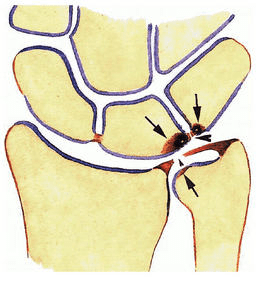Triangular Fibrocartilage Complex (TFCC) tear in the Wrist
What is it?
The TFCC is a highly complex and specialised structure found on the little finger side of the wrist. Its job is to provide stability and cushioning to the wrist whilst allowing for the great degree of movements the wrist has.

Who gets it and what causes it?
Tears of the TFCC can be caused by injury, such as a fall or in sport, these are called traumatic tears. TFCC tears may also occur due to the wearing down of the joint over time, these are called degenerate tears.
What are the signs and symptoms?
Patients may experience pain, weakness and restriction of movement in the wrist. Pain can be felt when attempting to put weight on the wrist such as when getting out of a chair. The pain can be a background dull pain made worse on movement resulting in a sharp pain.
chose the best photo

What tests will I need?
The first step is to undergo a consultation, involving a medical history and clinical examination. Mr Naqui usually organises further tests such as an x-ray or MRI scan. These may help to identify the extent of any associated arthritis or bone displacement and the extent of the tear.
What is the treatment?
Treatment will depend on the underlying cause and extent of tear. Initially conservative measures will be explored first including pain relief medication, splints and wrist strengthening physiotherapy.
If conservative measures are ineffective, a steroid injection can be given under x-ray control.
If an injection does not give lasting relief, surgery may be indicated.
The options available will be discussed in detail by Mr Naqui.
What does the surgical treatment involve?
Surgery may be performed under regional or general anaesthetic and is a day case procedure meaning that you will be able to go home the same day.
The TFCC will be assessed by key-hole, arthroscopic wrist surgery. This is also helpful in assessing the rest of the joint and is more accurate than an MRI scan.
Depending on the type and location of the tear, it maybe repaired or debrided (cleaned by cutting away any injured tissue and removing any debris).
The advantages and disadvantages of the different options will be discussed with you in detail by Mr Naqui.
What happens after the surgery?
Taking simple painkillers such as paracetamol regularly for the first 2 days after the operation will help to relieve any post-operative pain.
The wrist will be placed in a splint following the surgery for between 2 and 6 weeks, depending on whether the TFCC was repaired. Any sutures inserted in the skin will be removed at around 10 days.
Mr. Naqui and the hand therapist will then provide you with specific exercises to perform to regain strength and movements of the wrist. This will be early on after the operation.
When I can return to normal activity?
Activities which put significant stress on the wrist should be avoided for 3 months. Mr. Naqui will discuss with you regarding return to sports depending upon your particular sport, it maybe that you can have a protective splint to return to sport earlier. Driving can safely be resumed at around 6 weeks. Return to work is dependent on the nature of your work but usually expected within 2 weeks if it is non-manual work. You can discuss this with Mr Naqui at your consultation.
What are the complications of surgery?
The main potential complications that will be discussed with your prior to gaining consent for surgery include pain, swelling, infection, scarring, numbness, stiffness and ongoing weakness.
Pain and swelling are common following surgery, these should settle after a few days with simple painkillers. Infection is rare. Stiffness at the joint should improve if you follow the exercise programme as advised by Mr Naqui and the hand therapist following surgery. Injury to nerves around the wrist may occur during surgery and lead to a feeling of numbness around the scar area. In a proportion of patients restoration of full strength and movement does not occur. If this were to happen then Mr Naqui will discuss further options.





